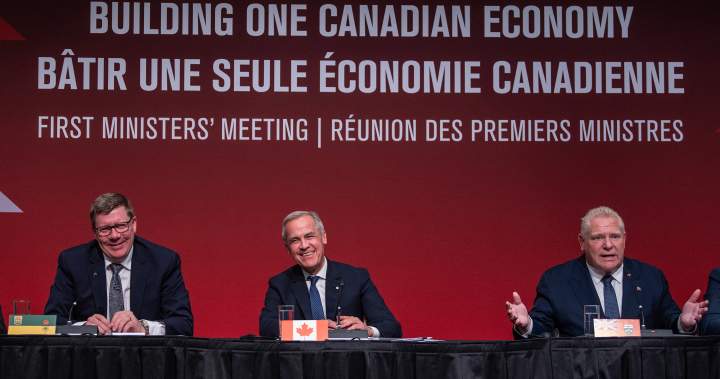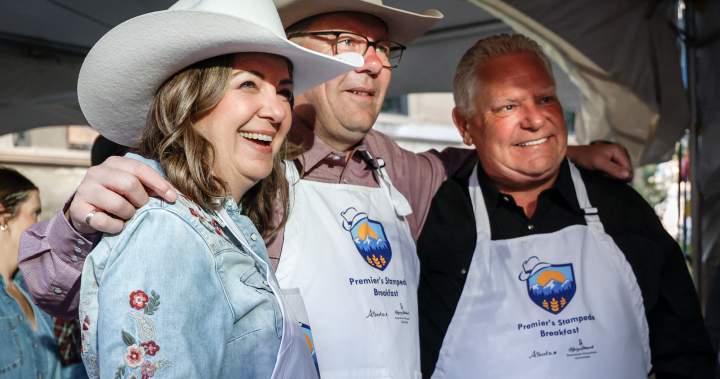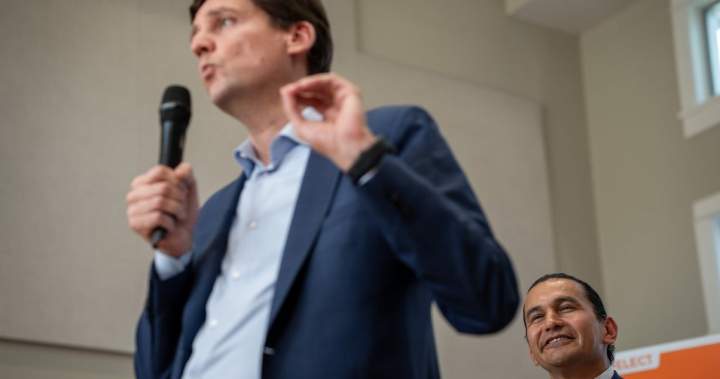Uncategorized
Canada’s premiers preview 3-day meeting in Ontario with trade top of mind

Tariffs and trade are top of the agenda as the country’s premiers arrive in Ontario’s cottage country for a three-day meeting that comes at a pivotal time for both Canada-U.S. and domestic relations.
The premiers’ summer gathering in Muskoka will also feature a Tuesday meeting with Prime Minister Mark Carney, as trade talks with the United States are expected to intensify.
Most of what the premiers are likely to discuss stems from U.S. President Donald Trump’s tariffs: trade negotiations, the direct impact on industries such as steel and aluminum, the increased pushes to remove interprovincial trade barriers and speed up major infrastructure and natural resource projects to counteract the effects of tariffs, as well as Indigenous communities’ concerns about them.

Day 1 of the premiers’ meeting involves discussions with Indigenous leaders including the Assembly of First Nations, the Métis National Council and the Native Women’s Association of Canada.
Carney himself is fresh off a meeting with hundreds of First Nations chiefs, many of whom have expressed concerns about their rights being sidelined as the prime minister looks to accelerate projects in the “national interest.”
Some of the top priorities premiers are pushing include pipelines and mining in Ontario’s Ring of Fire region, and chiefs have said that must not happen by governments skirting their duty to consult.
Ontario Premier Doug Ford, who has served for the past year as head of the Council of the Federation, is host of the meeting and said in a statement that protecting national interests will be top of mind.
“This meeting will be an opportunity to work together on how to respond to President Trump’s latest threat and how we can unleash the full potential of Canada’s economy,” Ford wrote.

Get daily National news
Get the day’s top news, political, economic, and current affairs headlines, delivered to your inbox once a day.
Trump and Carney agreed in June at the G7 summit to try and reach a trade deal by July 21 but Trump recently moved that deadline to Aug. 1, while telling Carney he intends to impose 35 per cent across-the-board tariffs on Canada that same day.

Carney has said Canada is trying to get an agreement on softwood lumber exports included in the negotiations with the United States.
British Columbia Premier David Eby said he intends to raise the issue and others of particular importance to B.C. at the meeting.
“(We want to) get access to the same level of attention, for example, on the softwood lumber as Ontario gets on the auto parts sector, (and) that we get the same amount of attention on capital projects as Alberta is currently getting in relation to their proposals,” Eby said last week in Victoria.
Alberta Premier Danielle Smith has been making a big push for new pipelines, but said during a press conference Friday that her focus would also be on premiers working together to address the tariff threat, including interprovincial trade.
“I was really pleased to sign (a memorandum of understanding) with Doug Ford during the time he was here in during Stampede, and other provinces are working on those same kind of collaborative agreements,” she said.
“We need to do more to trade with each other, and I hope that that’s the spirit of the discussion.”
Smith and Ford signed an MOU earlier this month to study new pipelines and rail lines between provinces, and both premiers also talked about wanting Carney to repeal a number of energy regulations like net-zero targets, the West Coast tanker ban and a proposed emissions cap.
Ford has also taken a lead role on increasing interprovincial trade, signing MOUs with several provinces and enacting a law to remove all of Ontario’s exceptions to free trade between the provinces and territories.

Nova Scotia’s Tim Houston is another premier banging the drum of interprovincial trade, saying the trade war is forcing action on it.
“We’re seeing the benefit of working together to respond to economic threats from the U.S. by breaking down internal trade barriers and opportunities to expand in other international markets,” he wrote in a statement.
Ford has said the premiers will also talk about emergency management, energy security, sovereignty and national security, health, and public safety. The premiers have also been pushing the federal government to reform bail laws and Carney said last week that legislation will be introduced in the fall and he expects to discuss the issue with the premiers on Tuesday.
The premiers’ summer meeting also signals a changing of the guard, with the role of chair of Council of the Federation moving between provinces annually.

But after Ford is no longer chair, he’s not expected to take too much of a back seat on all of the aforementioned issues.
He is still premier of the most populous province, has built a strong relationship with Carney, often singing the prime minister’s praises, and has done frequent American TV interviews making the case for increased trade over tariffs.
Those network appearances, in part, earned him a nickname of “Captain Canada” — a persona he used to massive political benefit. Ford made the fight against tariffs and Trump the central part of his re-election campaign and voters returned him to government with a third consecutive majority.
© 2025 The Canadian Press
Uncategorized
Ontario, Alberta and Sask. push plan for new pipelines, railways to connect Canada

At the edge of a major meeting of the country’s top leaders, the leaders of three major provinces unveiled an agreement to push for massive new pipeline and railway projects.
On Tuesday, Ontario and Alberta added Saskatchewan to an agreement signed a couple of weeks ago, specifically to explore trade and plan pipelines and new rail infrastructure.
That plan, outlined in a memorandum of understanding, is to work together to study a potential east-west pipeline made with domestically produced steel to connect to the not-yet-built James Bay deep-sea port in Ontario.
It also means the two provinces will study the feasibility of building a railway line from the mineral-rich Ring of Fire in northern Ontario to mineral processing facilities in Western Canada.
As she unveiled the latest recruit to the agreement, Alberta Premier Danielle Smith fired a warning shot at Prime Minister Mark Carney, who was due to arrive in the same building for talks with premiers about an hour earlier.
“If Prime Minister Mark Carney doesn’t want to work with us, it’s not just myself and Scott Moe he has to worry about; he’ll also have to contend with Premier Doug Ford,” she said. “It’s time to get rid of the bad laws that have harmed Canada’s ability to grow the energy sector.”

Get daily National news
Get the day’s top news, political, economic, and current affairs headlines, delivered to your inbox once a day.
Ford’s office said the agreement unveiled with Saskatchewan on the edges of a series of major leaders meetings in Muskoka was broadly the same as the one Ontario and Alberta had already agreed to, with some minor changes.
“We are sending a clear signal that Canada’s energy future will be built by Canadians, for Canadians,” Saskatchewan Premier Scott Moe, the latest signatory, said in a statement.
“This agreement commits our provinces to work together to unlock new markets, shore up our supply chains from mine to port and advocate for the federal reforms our industry needs.”

Where other major provinces stand on the issue remains unclear. Quebec Premier François Legault did not answer questions in English about the pipeline agreement signed by the three provinces.
When asked about the possibility of a railway project, Manitoba Premier Wab Kinew said his province “already (has) a railway.
“This is not imaginary,” Kinew said tersely. “I think our project’s the best because it’s real.”
Kinew was referring to his proposal to build a new port at Hudson Bay to create shipping routes for Canadian exports, including oil.
When asked whether Ontario and Alberta have Manitoba’s buy-in for the joint provincial project,t Kinew said he was “on Team Canada.”
He added, “We’re all working together, building up the country.”
British Columbia Premier David Eby said he wasn’t invited to sign the agreement. Asked if he would have taken part if he had been asked, he replied: “I don’t know what it said.”
Separately, Ontario has sewn up interprovincial trade agreements with a total of 10 provinces and territories, including British Columbia, Alberta, Manitoba and Saskatchewan.
© 2025 Global News, a division of Corus Entertainment Inc.
Uncategorized
Blue Jays tickets spiking as Toronto continues winning ways, topping Yankees

They’re the talk of the town – and if you want to see the Toronto Blue Jays live at the last minute, it’s going to cost you.
The cheapest verified resale tickets for the Blue Jays’ games against the New York Yankees Tuesday and Wednesday in Toronto are selling for more than $150 for a pair in the 500 section, Ticketmaster’s website shows.
The Blue Jays, sitting in first place in the American League East, now have a four-game lead over the Yankees in the division after Monday’s 4-1 win at the Rogers Centre.
Bo Bichette’s two-run double sparked a four-run fifth inning that saw the Blue Jays improve to 59 wins and 41 losses on the season so far.

Get breaking National news
For news impacting Canada and around the world, sign up for breaking news alerts delivered directly to you when they happen.
Bichette’s double brought the sold-out crowd of 41,786 to their feet and finally took advantage of a solid night at the plate. The Blue Jays have now won 11 in a row at Rogers Centre.
Outfield district tickets, which cost $20 and get you access into the stadium, appear to no longer be for sale for Tuesday and Wednesday’s games, Ticketmaster’s website shows.
As of Tuesday morning, the cheapest set of tickets for Tuesday’s game were priced at $190.32 for two seats in section 535; the cheapest pair of tickets for Wednesday’s game were priced at $161.84 for two seats in section 517.
However, outfield district tickets for the next Blue Jays home game – on Aug. 1 against the Kansas City Royals – are available, as are tickets with seats as cheap as $29.04.
First pitch for Tuesday is set for 7:07 p.m.
© 2025 Global News, a division of Corus Entertainment Inc.
Uncategorized
B.C. signs 2 more trade deals, this time with with Manitoba, Yukon

British Columbia has signed two more internal trade agreements with other Canadian jurisdictions to boost trade and labour mobility, a day after a similar deal with Ontario was announced.
B.C. Premier David Eby says in a statement that the province has signed separate deals with Manitoba and Yukon, agreeing to work “to remove trade barriers between provinces and territories.”
The statement says the deal signed with Manitoba Premier Wab Kinew includes measures to increase the mobility of regulated workers and professionals between the two provinces, and allowing direct alcohol sales from Manitoba to B.C. consumers.

Get daily National news
Get the day’s top news, political, economic, and current affairs headlines, delivered to your inbox once a day.
B.C. alcoholic beverages can already be sold directly to consumers in Manitoba.
The Yukon agreement signed with Premier Mike Pemberton focuses on the removal of trade barriers as well as the alignment of standards for regulated occupations.
The deal between B.C. and Yukon is in addition to a memorandum in May that the two jurisdictions will co-operate on possibly connecting their power grids.
“With these trade agreements, we’re making it easier to buy and sell our great Canadian products to our fellow Canadian neighbours,” Eby says in the statement. “This is another important step toward building a stronger economy here at home — one that’s less reliant on the U.S and works better for people.”
The deals were signed at the premiers’ meeting in Huntsville, Ont., where B.C.’s agreement with Ontario was made public Monday.
Ontario also announced agreements with Nunavut, Yukon and the Northwest Territories, which Premier Doug Ford said when combined with the B.C. deal would help Canada unlock roughly $200 billion in economic potential.
© 2025 The Canadian Press
-

 Uncategorized1 month ago
Uncategorized1 month agoThese ’90s fashion trends are making a comeback in 2017
-

 Uncategorized1 month ago
Uncategorized1 month agoAccording to Dior Couture, this taboo fashion accessory is back
-

 Uncategorized1 month ago
Uncategorized1 month agoThe old and New Edition cast comes together to perform
-

 Uncategorized1 month ago
Uncategorized1 month agoUber and Lyft are finally available in all of New York State
-

 Uncategorized1 month ago
Uncategorized1 month agoNew Season 8 Walking Dead trailer flashes forward in time
-

 Uncategorized1 month ago
Uncategorized1 month agoMeet Superman’s grandfather in new trailer for Krypton
-

 Uncategorized1 month ago
Uncategorized1 month ago6 Stunning new co-working spaces around the globe
-

 Uncategorized1 month ago
Uncategorized1 month agoThe final 6 ‘Game of Thrones’ episodes might feel like a full season







